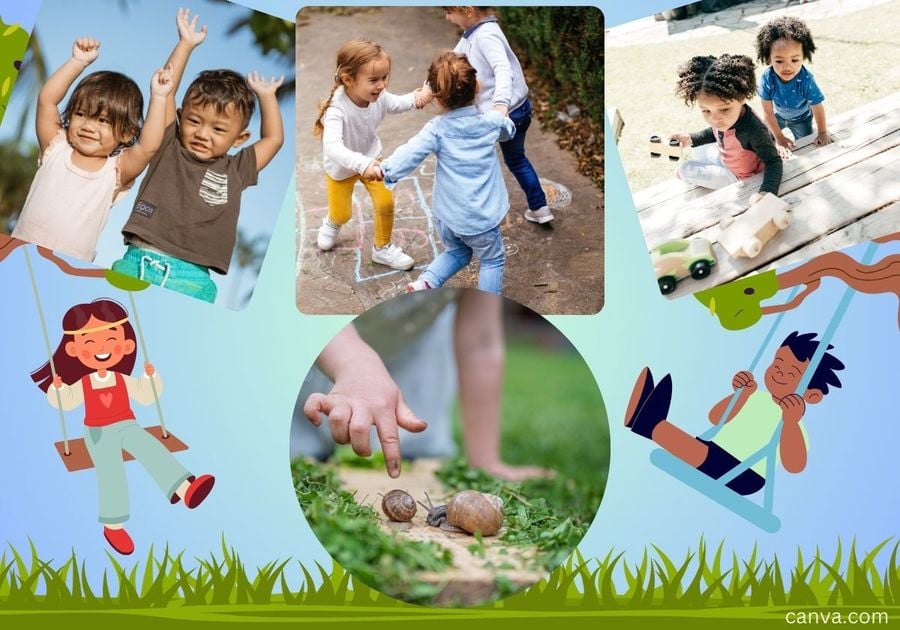Outdoor play is essential in promoting healthy child development as it allows children to be in an environment where they can have fun while engaging in activities that allow them to develop various skills.
Children's physical development is very rapid and they need to explore the world around them
Outdoor play provide the perfect opportunity to fulfill the children natural desire to be active. respond to this need. When children has the chance to run, skip, climb, and jump, they are developing the motor skills which will be very important in later life. Outdoor play will help children to develop coordination, balance, and strength, it will also help to keep them fit and healthy.
With the world turning into a global village, the 21st century has seen a massive change with children preferring to remain indoors instead of playing outside. The virtual world has taken over reality with things such as videos, computer games and streaming platforms. They replace the fun that children used to have in the great outdoors. A sedentary lifestyle is becoming the norm with childhood obesity on the rise and academic intelligence taking priority over emotional maturity. While it is important to provide children with a good education, it is just as crucial to ensure that children have time for play.
Here are several ways outdoor activities can influence early childhood development:
- Physical Development - Outdoor play provides opportunities for children to engage in physical activities such as running, jumping, climbing, and balancing. These activities help in developing motor skills, coordination, and strength.
- Sensory Stimulation - Outdoor environments offer a wide range of sensory experiences such as feeling different textures, hearing various sounds, and observing different colors and shapes. These sensory stimulations are essential for cognitive development and learning.
- Social Skills - Outdoor play encourages interaction with peers, siblings, and adults, fostering the development of social skills such as sharing, cooperation, communication, and conflict resolution. It helps children learn to negotiate, compromise, and collaborate.
- Emotional Well-being - Spending time outdoors has been linked to reduced stress, anxiety, and depression in children. Natural environments provide a calming effect and can help children regulate their emotions, develop resilience, and build self-confidence.
- Cognitive Development - Outdoor play stimulates curiosity and creativity, encouraging children to explore, investigate, and problem-solve. Nature-based activities also offer opportunities for learning about the environment, science, math, and the natural world.
- Appreciation for Nature - Early exposure to outdoor environments instill a love and appreciation for nature in children. It helps them develop a sense of stewardship and responsibility towards the environment; promoting environmentally sustainable attitudes and behaviors.
- Health Benefits - Regular outdoor play promotes physical fitness and reduces the risk of obesity and related health issues. Exposure to natural sunlight also helps regulate sleep patterns and vitamin D production.
In summary, outdoor activities play a vital role in shaping various aspects of early childhood development, including physical, social, emotional, and cognitive domains.
Encouraging children to spend time outdoors provides numerous benefits that contribute to their overall health, well-being, and learning experience.
Here are some outdoor activities tailored for young children that promote learning:
- Nature Walks - Take children on guided nature walks where they can explore different environments, observe plants, insects, and animals, and learn about the natural world around them.
- Sensory Play - Set up sensory stations outdoors where children can explore different textures, smells, and sounds using materials like sand, water, mud, leaves, and rocks. This helps stimulate their senses and enhances cognitive development.
- Gardening - Engage children in gardening activities such as planting seeds, watering plants, and observing plant growth. This teaches them about plant life cycles, responsibility, and the importance of caring for the environment.
- Outdoor Music and Movement - Encourage children to engage in music and movement activities outdoors, such as dancing, singing, or playing with simple musical instruments like drums or xylophones.
- Storytelling and Dramatic Play - Create outdoor storytelling areas where children can listen to or act out stories inspired by nature. This promotes language development, imagination, and creativity.
- Bug Hunts and Nature Scavenger Hunts - Organize bug hunts or nature scavenger hunts where children can search for specific items or creatures outdoors, fostering curiosity and observation skills.
These outdoor activities not only promote learning but also encourage a deeper connection with nature and support holistic development in early childhood.
- https://mybrightwheel.com/blog/engaging-outdoor-activities-for-preschoolers
- https://happytoddlerplaytime.com/outdoor-learning-activities-for-kids-toddlers-preschoolers-kindergardners
- The importance of outdoor play for young children's healthy development: https://journals.lww.com/pbj/fulltext/2017/09000/the_importance_of_outdoor_play_for_young.9.aspx
- Trisha Maynard & Jane Waters (2007) Learning in the outdoor environment: a missed opportunity?, Early Years, 27:3, 255-265, DOI: 10.1080/09575140701594400
- Project Learning tree: https://www.plt.org/educator-tips/activities-to-do-with-children-outdoors
- https://happytoddlerplaytime.com/outdoor-learning-activities-for-kids-toddlers-preschoolers-kindergardners



